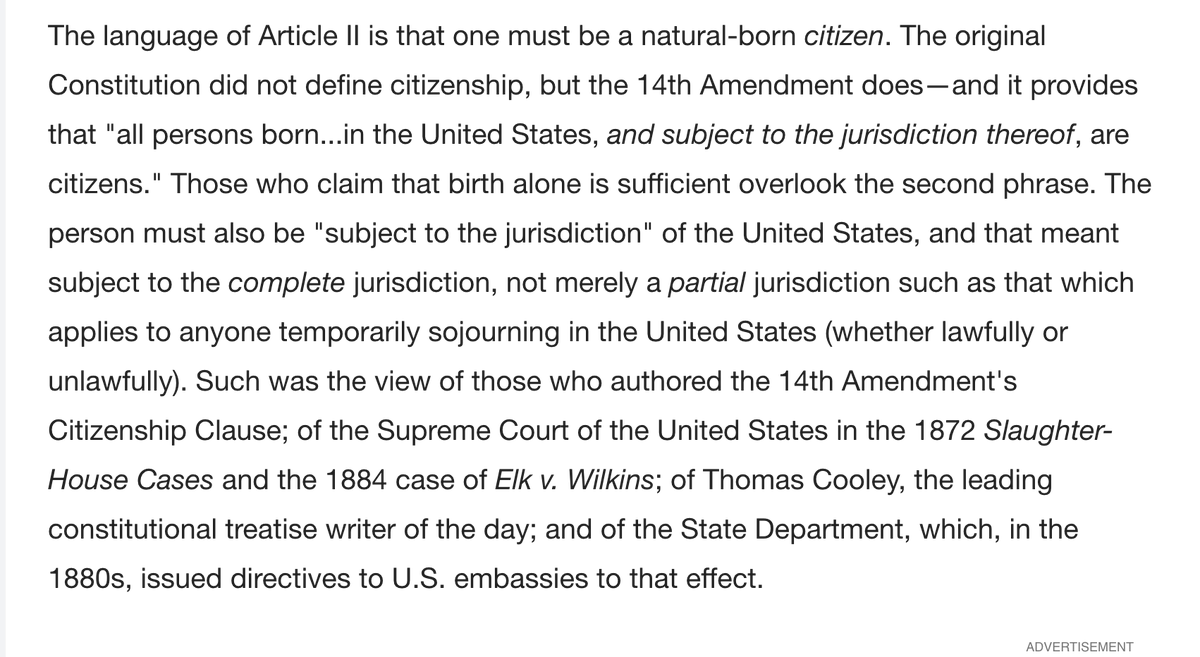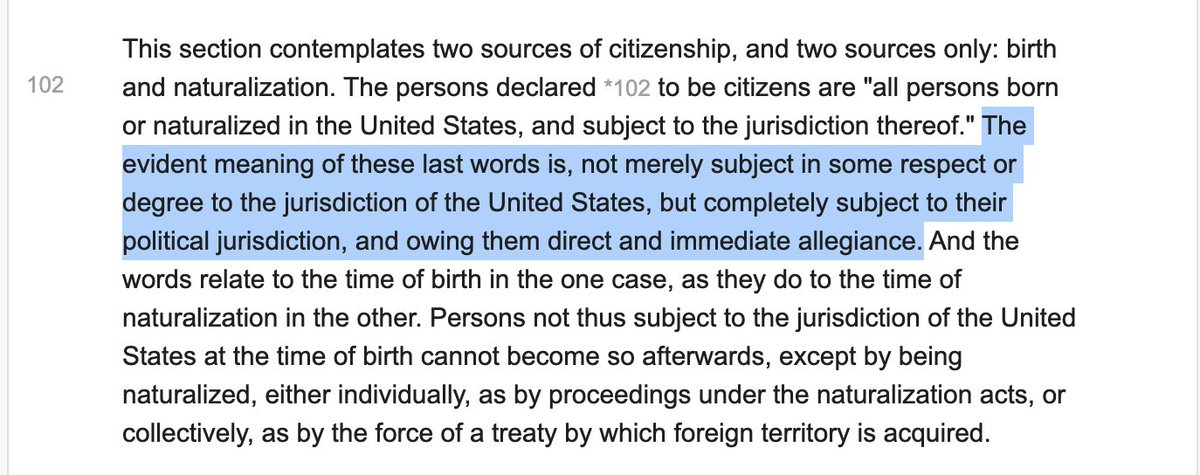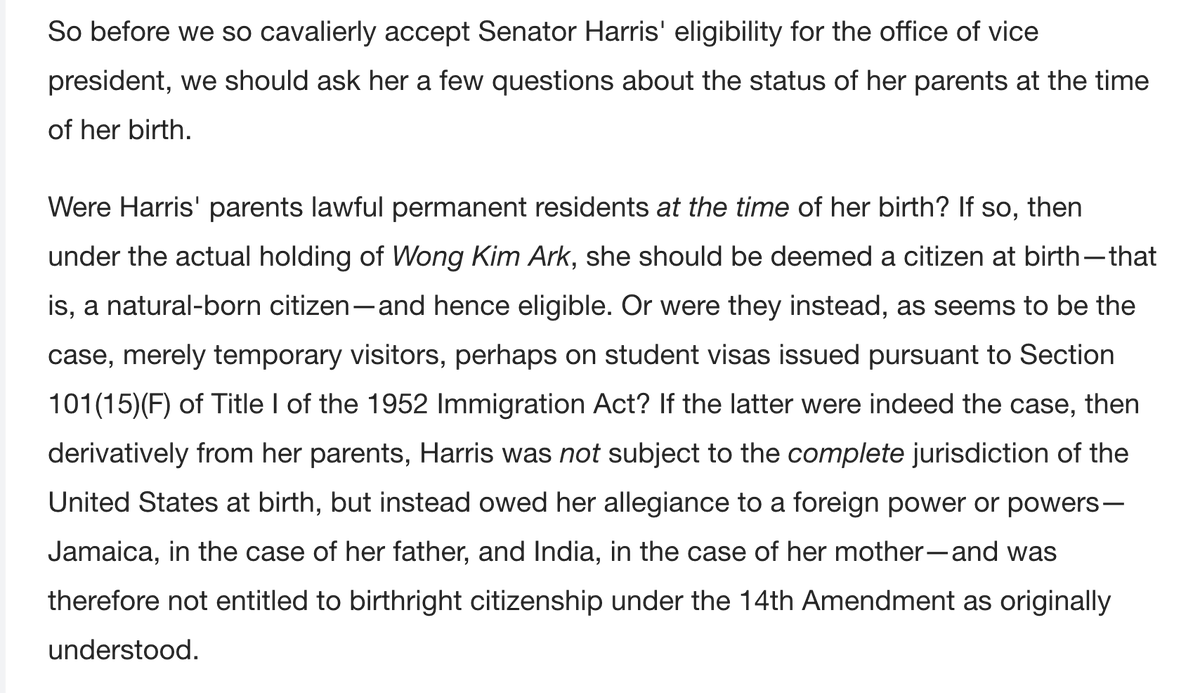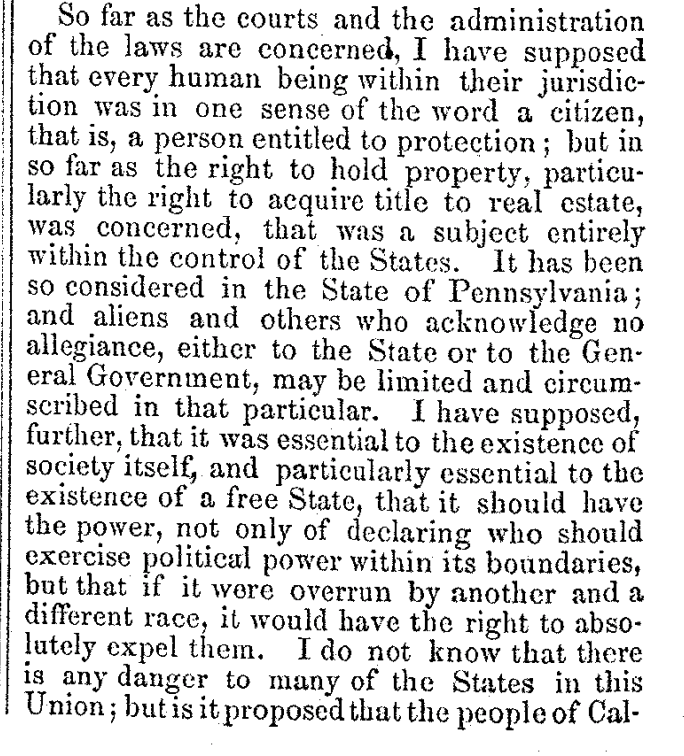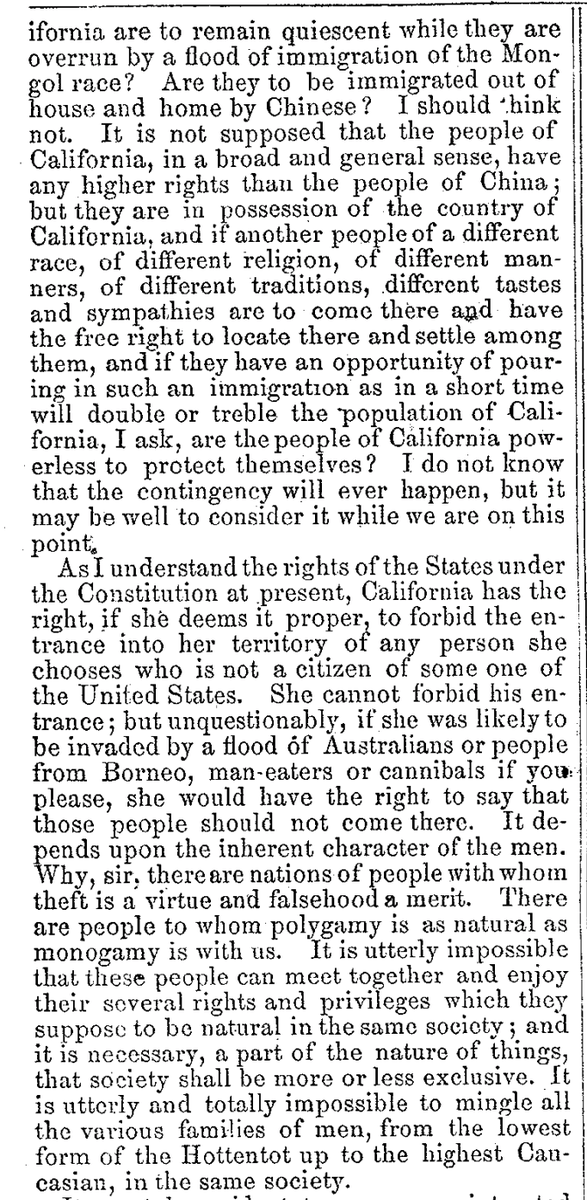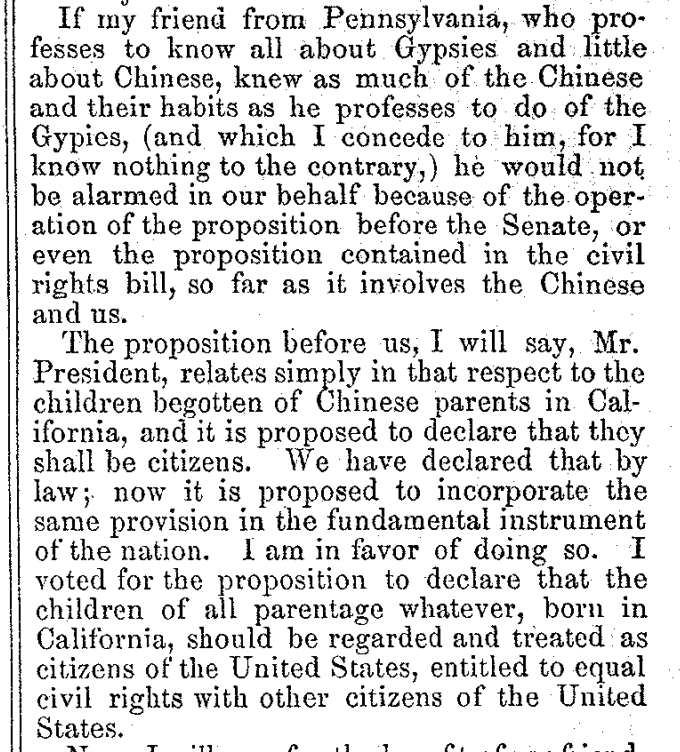Dr Eastman& #39;s views on the 14th Amendment are, to say the least, far outside the legal mainstream on this issue. However, while he might be a fringe voice, he& #39;s a credentialed fringe voice. So let& #39;s examine his reasoning in the Newsweek article he links.
tl:dr - he& #39;s very wrong. https://twitter.com/DrJohnEastman/status/1293541246489649154">https://twitter.com/DrJohnEas...
tl:dr - he& #39;s very wrong. https://twitter.com/DrJohnEastman/status/1293541246489649154">https://twitter.com/DrJohnEas...
Eastman& #39;s view can be summed up as this: those who rely on a plain-language reading of the 14th Amendment are wrong, and the Supreme Court was wrong in Wong Kim Ark.
You might think that any such argument is on an incredibly weak footing - and, well, you& #39;d be right.
You might think that any such argument is on an incredibly weak footing - and, well, you& #39;d be right.
Eastman elaborates a bit, and let& #39;s dig into that reasoning just a bit.
At the start, though, it& #39;s worth noting that none of the things Eastman cites - including the State Department guidance - are binding sources on this issue.
At the start, though, it& #39;s worth noting that none of the things Eastman cites - including the State Department guidance - are binding sources on this issue.
A treatise is a treatise, and the State Department is not the branch of the government entrusted with resolving disputes over the meaning of the Constitution.
As for the two SCOTUS cases, neither is on-point. But let& #39;s dig into them, starting with The Slaughterhouse Cases.
As for the two SCOTUS cases, neither is on-point. But let& #39;s dig into them, starting with The Slaughterhouse Cases.
The Slaughterhouse Cases, 83 U.S. 36 (1873)* turned on the privileges and immunities clause of the 14th Amendment. They did not, in any way, touch upon the question of the parentage of those born in the USA.
*Eastman gets that date wrong in his article.
*Eastman gets that date wrong in his article.
So while there is a line in the case that supports Eastman& #39;s hypothesis, it& #39;s dicta - something that was not necessary to the determination of the case, and which is not binding law.
(It is close in time to the Amendments, but I& #39;ll discuss that aspect more a bit later.)
(It is close in time to the Amendments, but I& #39;ll discuss that aspect more a bit later.)
Elk v. Wilkins, 112 US 94 (1884) did deal with citizenship at birth, and this is the case that uses the phrase "complete jurisdiction." But it does so in a very specific context, involving the citizenship of Native Americans.
That& #39;s critical, because Native American Tribes - as we saw again just this Supreme Court term - have a unique status under US law. They& #39;re "quasi-sovereign" bodies, and the jurisdiction of the US over their members was - even at that time - limited.
This is apparent throughout the case. And there& #39;s something that Eastman neglects to mention even while relying on this case -
He relies on the highlighted sentence in this paragraph, which uses the phrase "completely subject to their political jurisdiction."
He relies on the highlighted sentence in this paragraph, which uses the phrase "completely subject to their political jurisdiction."
But:
(1) As I will discuss later, "completely subject to their political jurisdiction" and "child of immigrants" are not incompatible.
(2) Eastman doesn& #39;t discuss the very next paragraph of the case.
(1) As I will discuss later, "completely subject to their political jurisdiction" and "child of immigrants" are not incompatible.
(2) Eastman doesn& #39;t discuss the very next paragraph of the case.
And that next paragraph, which Eastman - with characteristic intellectual honesty - ignores, does not favor his view. At. All.
Native Americans are not compared with the children of the subjects of foreign governments born within the United States. That& #39;s clear.
Native Americans are not compared with the children of the subjects of foreign governments born within the United States. That& #39;s clear.
The comparison is to children of the subjects of foreign governments *born within the domain of that government* and to the children of ambassadors, who have diplomatic immunity.
Those are people not born within the complete jurisdiction of the United States, under any view.
Those are people not born within the complete jurisdiction of the United States, under any view.
So Eastman is embracing dicta in one case, and ignoring critical clarifying material in the other. That& #39;s sloppy scholarship by any standard.
Moving on, Eastman attempts - badly - to distinguish Wong Kim Ark. But he has to try to pull a fast one to do it.
Can you spot it?
Moving on, Eastman attempts - badly - to distinguish Wong Kim Ark. But he has to try to pull a fast one to do it.
Can you spot it?
It& #39;s here - "lawful, permanent residents."
That& #39;s a very specific status, with a very specific legal definition. It& #39;s also, to the best of my knowledge, not a legal status that existed in 1898.
That& #39;s a very specific status, with a very specific legal definition. It& #39;s also, to the best of my knowledge, not a legal status that existed in 1898.
Yet Eastman takes this very specific legal status, which did not exist at the time of the Wong Kim Ark decision, and pretends that it& #39;s somehow determinative of Kamala Harris& #39;s claim to citizenship.
And don& #39;t be fooled - Eastman is not just questioning Harris& #39;s claim to Natural Born Status; he& #39;s questioning whether Harris *is a citizen at all.*
That& #39;s an unavoidable consequence of his logic.
That& #39;s an unavoidable consequence of his logic.
Fortunately for Harris, and for the United States, Eastman is a dishonest hack.
Even if we assume that & #39;domicile& #39; is important, lawful permanent residents aren& #39;t the only non-citizens considered to be domiciled in the United States.
Even if we assume that & #39;domicile& #39; is important, lawful permanent residents aren& #39;t the only non-citizens considered to be domiciled in the United States.
And when we consider the phrase "subject to the jurisdiction," we should also note that the Supreme Court, in Plyler v Doe, Plyler v. Doe, 457 US 202, 211 (1982) expressly rejected the claim that undocumented immigrants are not "subject to the jurisdiction" of the United States.
Oh - and we see at the end of the article that Eastman is, in fact, expressly questioning whether Harris is a citizen at all - so at least he recognizes the consequences of his tortured logic.
So far, I& #39;ve made a case for why Eastman& #39;s take is dishonest hackery. Now let& #39;s make a slightly more positive argument for birthright citizenship. Specifically, let& #39;s look at the views of those who voted in the minority on the passage of the Amendment, and dissented in cases.
Let& #39;s start with the Senate debate during the passage of the 14th Amendment - and specifically with the views of Mr. Cowan, who voted against passage.
Mr. Cowan was very disturbed by the thought that the Amendment would confer citizenship on certain people:
Mr. Cowan was very disturbed by the thought that the Amendment would confer citizenship on certain people:
Mr. Cowan of Pennsylvania& #39;s racist and bigoted rant on the floor of the Senate continued for some additional text, which I& #39;ll spare you - but you get the flavor. Mr. Cowan was very much against the idea that just anyone could be a US Citizen.
He was a 19th Century MAGAt.
He was a 19th Century MAGAt.
Mr Conness of California spoke in reply to Mr. Cowan, and was very explicit in noting that the Amendment would guarantee birthright citizenship to exactly those people Mr. Conness thought unworthy of being citizens.
There was a roll-call vote on the amendment in the Senate.
Cowan voted against passage. It passed anyway.
Cowan voted against passage. It passed anyway.
The majority in Wong Kim Ark held that there are only three ways a child can be born in the United States without being subject to the jurisdiction - children of members of Native American tribes, children of alien enemies occupying the USA, and children of diplomats.
Chief Justice Fuller, writing in dissent, complained that this was "unreasonable" because it meant that the children of "Mongolian, Malay, or other race" would be eligible to be President, when children of Americans born abroad would not.
But that was a dissent; Fuller lost.
But that was a dissent; Fuller lost.
So we see that Eastman& #39;s view of the meaning of the 14th Amendment, and, indeed, of Wong Kim Ark, was rejected - not merely recently, but at the time of the Amendment& #39;s passage, and at the time the decision was published.
And it is not that Eastman& #39;s objections weren& #39;t considered by those who were there and involved in the Amendment& #39;s passage or in deciding the case. Those objections were considered.
They were rejected then; they are still wrong today.
They were rejected then; they are still wrong today.
Postscript -
I did not see this, but it confirms my view that Eastman is an unprincipled hack. In fact, he& #39;s more of a hack than some of the hardcore Obama birthers, who have at least been consistent in the application of their bigotry. https://twitter.com/Possibly_Mark1/status/1293719608046706688?s=20">https://twitter.com/Possibly_...
I did not see this, but it confirms my view that Eastman is an unprincipled hack. In fact, he& #39;s more of a hack than some of the hardcore Obama birthers, who have at least been consistent in the application of their bigotry. https://twitter.com/Possibly_Mark1/status/1293719608046706688?s=20">https://twitter.com/Possibly_...
PPS -
Seth is off in la-la land again.
14A jurisdiction is, at best, tangentially connected with modern concepts of personal and subject matter jurisdiction. Instead, as the court noted in Wong Kim Ark, it goes back to ancient views on allegiance. https://twitter.com/SethAbramson/status/1293696740013596672?s=20">https://twitter.com/SethAbram...
Seth is off in la-la land again.
14A jurisdiction is, at best, tangentially connected with modern concepts of personal and subject matter jurisdiction. Instead, as the court noted in Wong Kim Ark, it goes back to ancient views on allegiance. https://twitter.com/SethAbramson/status/1293696740013596672?s=20">https://twitter.com/SethAbram...

 Read on Twitter
Read on Twitter

